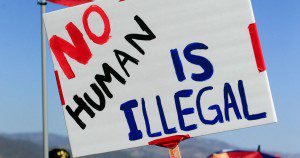A summer of violence is winding to an end, with yet another war between Israel and Hamas, the rapid rise of ISIS and its reign of terror against every possible sectarian or religious minority, and nations from the Magrib to Southeast Asian slipping into failed state status. Two things have become clear. First that religion is central to human conflict to a degree unparalleled in recent decades. And secondly that classical inter-religious dialogue has no real role to play in many of these conflicts.
The foundation of inter-religious dialogue is the assumption that the exchange of words can be the basis for achieving not merely mutual understanding, but mutual acceptance and even peace between warring parties. Dialogue can become the basis for articulating shared goals, and working together to achieve them despite differences.
This puts a huge burden on words, on the power of rational speech to transform human persons and societies. Too large a burden.
Back when I lived in Malaysia I was driving on a narrow to lane highway to teach in the town of Ipoh. There was jam, and when I finally got to the cause I found that a truck had hit a motorcyclist at the crossroads in Goping. The rider was lying in the road moaning next to his bike. A group of other motorcyclists were standing nearby. The truck driver had run away, fearing the motorcyclists, who were prone to rough justice. Cars were just going past, unwilling to get involved. I got out and asked if anyone had called an ambulance. Goping at that time didn’t even have a doctor. But nobody had called an ambulance.
Had anybody helped the man on the ground? No. The motorcyclists told me that he might die. They were afraid of the malevolent spirits that would come if he did. Many claimed to have already heard the spirits coming. If they got involved these spirits might possess them. They wouldn’t help get him into my van.
It was a fascinating example of how indigenous Malaysian Chinese religious concepts influence human action. And because I teach about Chinese folk religion, I would have loved to engage in a dialogue about indigenous religious concepts. Instead I got pushy, even angry. I made them put their friend in the van and forced one of his friends accompany me on the drive to Ipoh.
There is no time for dialogue when a life is in the balance.
He lived.
Another time I drove past a man who was clearly beating a woman on the side of the road. I stopped and got out of the car. He stopped, and told me to go away. I ignored him and asked the woman if she wanted to go somewhere. She told me she wanted to go to her sister’s house and got in my car. He threatened me. I just got in the car and took her to her sister.
Again, I chose not to engage in a dialogue about constructions of gender and authority in the indigenous Muslim culture. It would have been fascinating. But dialogue about cultural difference is immoral if it doesn’t stop the violence.
But there is a third, and more insidious, moment when dialogue is wrong. That is when those engaged in dialogue begin to pervert language itself so that what appears to be truth is a lie. In this case dialogue isn’t merely inappropriate, it perpetuates divisions and hatred.
And right now this is what makes any kind of dialogue with Israel and the Palestinians deeply difficult.
Just a few days ago I heard, for the 10th time, the claim that Israel was committing “genocide” in Gaza. Attacks by Israel have claimed 1,400 civilian casualties in a population of 1.8 million. Genocide? Using that word is the verbal equivalent of spitting on the graves in the Nazi concentration camps, the killing fields of Cambodia, Rawanda, and Bosnia.
And on the same day I heard a supporter of Israel repeat, again, that the uncontrolled and uncontrollable flailing of homemade rockets against Israel’s iron dome is an “existential threat” to Judaism. Which is a heartless attempt to mask the real desperation of the Gazans compared to the near absolute safety of Israelis. If 1,400 civilian casualties isn’t genocide then a dozen or so certainly doesn’t represent an existential threat.
And thus both sides now fling words against each other that have no persuasive power except to those already persuaded, and a great deal of power to confuse and mislead those who are not.
But more dangerously for peace – these words and phrases have become the stock language for almost all attempts at dialogue. Just as both sides are imprisoned by fear and anxiety, they have created a verbal prison from which neither can emerge to actually speak the truth about itself, its needs, and its claims.
Neither side escape their deadly linguistic embrace.
In these circumstances it may be that dialogue, at least about the war, simply needs to stop. Nor can simple action, like the actions I took in Malaysia, do much good. Moral clarity has also been imprisoned by smokey words. Righteousness has become so confused with self-righteousness that doing the right thing may be beyond human discernment.
In such circumstances silence may be the only way forward.
Silence, but not an isolated silence. Rather the practiced, shared silence that leads us to hear, beneath the buzz of words, the beating of human hearts other than our own, to look into the eyes of those we have been trained to mistrust and hate.











